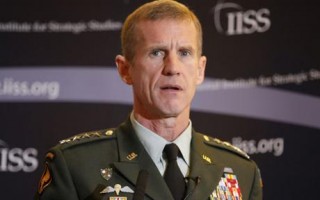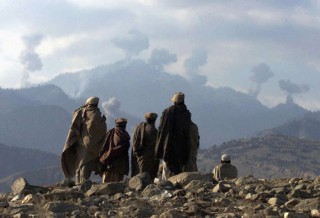“This was not the war that the commanding General had in mind, this was not his ambition, this was not the challenge he aspired for and this was certainly not what he was trained for”

The world we live in, is like a big school, the day we stop learning, is the day we die.
And as students in the big school of life, we all know that in every class room there are students who tend to act out or misbehave. There are students who are trouble makers by nature, or maybe suffer from (ADHD) attention deficit/hyperactivity disorder. But those don`t worry me as much as the student who suddenly misbehave after being the topnotch kid of his class, I’m talking about the four- star General, Stanely McChrystal who suddenly started mocking his civilian leaders, and showed disrespect to the American political and military administration.
General McChrystal was summoned to the white house and removed from his command in Afghanistan by President Obama on Wednesday for the general’s disparaging remarks about White House leadership in a Rolling Stone magazine article.
The profile-style article was titled, “The Runaway General.” In it, McChrystall and his aides criticized Obama, Ambassador Karl Eikenberry, special envoy Richard Holbrooke and Vice President Joseph Biden.
But why, why would the U.S top Afghanistan commander criticize his civilian administration in such inflammatory and contemptuous way?
May be the answer would seem more apparent if we went through the reasons and common causes of bad behavior in the class room and see if we could apply or even compare them to the status quo and findings in Afghanistan.
Common Causes of Bad Behavior
Psychologists find many reasons for why a student misbehaves regularly in the classroom. They say that the trick for teachers is to observe the child and find out why.
In most cases, teachers will discover that the bad behavior is usually based on one of a few common factors. At any given time, a student may display annoying or unwanted behavior because she/ he
• needs more choices and control
• feels like she/he doesn’t belong, feels lonely
• is frustrated or bored by the lesson
• doesn’t feel safe
And back to the Afghani theatre.When you think of the war in Afghanistan, what images come to mind? Taliban fighters? Burqa-clad women? Poppy fields? Friendly fire? Debating politicians? War protesters?
Well,none of the above images would intrigue or stimulate a professional and highly trained West Point graduate military officer, let alone a General in command of NATO and U.S armies in Afghanistan.
I`m not going to elaborate on the futility of the American war in Afghanistan, for it is becoming more and more apparent with every passing day. But my concern is the impact of this make -believe war on the American military.
Protecting a narco-state controlled by traffickers and warlords, supporting a deeply rooted corrupt karazi government, liberating veiled and oppressed women, caught up in friendly fire and yeiding to misguided and pre staged policy are hardly the satisfactory job descriptions of a top commander of war.
This was not the war that the commanding General had in mind, this was not his ambition, this was not the challenge he aspired for and this was certainly not what he was trained for.

Students Will Obey the Class Rules if They Understand Their Importance, The American military is waging a war not fully understood, and chasing ghosts of a never seen army.
And that what led Thomas Friedman, to courageously ask, “What do we win if we win?” … and says the answer is: not much.
but while the allied air forces continue the redistribution of the rubble in Kabul, the objectives and purposes of this ” war on terrorism” become, like the dust rising from that battered city, more difficult to comprehend.
These circumstances yielded not much of a choice for the General in command of the Afghanistan war, made him feel like he didn`t belong and added to his frustration and sense of insecurity.
And these grim circumstances were the causes behind the bad behavior of the general, especially that McChrystal was reportedly known for saying and thinking what other military leaders are afraid to, McChrystal preferred criticizing the rationale of the Afghani war to sipping beer while babysitting Hamid karazi.
The reasons behind the cynical and contemptuous remarks made by General McChrystal, reminded me of Al Pacino`s lines in “the Recruit” film, in which he portrayed the character of a CIA agent ” Walter Burke”. And at the finale of the movie he goes;
You think you know me?
You think you know me, don’t you?
You don’t. There was a time… There’s this parish priest, goes up to the pope, drops down on his knees, starts weeping, asking forgiveness. “Holy Father, Holy Father, what am I to do? “What am I to do?”
l do not believe in God anymore.What am I to do?” You know what the pope said?
“Fake it.”
I couldn’t…fake it… anymore.
So now I’m gone.
I’m inclined to believe that General McChrystal did vent his grievances over the conduct of the war, in a way that so challenged civilian authority over the military simply because he doubted the legitimacy of this “war on terrorism” in Afghanistan and even more he couldn’t hide what he felt inside. He couldn’t live in a world of make- believe, he couldn’t …fake it.
Obama said McChrystal’s dismissal was needed to safeguard the unity of the war effort but insisted the switch in generals was a “change in personnel but it is not a change in policy.”…I truly think that president Obama should revise and rephrase his statement, because what America really needs in Afghanistan, is a change in policy not in personnel.

Ashraf Ezzat is an Egyptian born in Cairo and based in Alexandria. He graduated from the faculty of Medicine at Alexandria University.
Keen not to be entirely consumed by the medical profession, Dr. Ezzat invests a lot of his time in research and writing. History of the ancient Near East and of Ancient Egypt has long been an area of special interest to him.
In his writings, he approaches ancient history not as some tales from the remote times but as a causative factor in our existing life; and to him, it’s as relevant and vibrant as the current moment.
In his research and writings, Dr. Ezzat is always on a quest trying to find out why the ancient wisdom had been obstructed and ancient spirituality diminished whereas the Judeo-Christian teachings and faith took hold and prospered.
Dr. Ezzat has written extensively in Arabic tackling many issues and topics in the field of Egyptology and comparative religion. He is the author of Egypt knew no Pharaohs nor Israelites.
He writes regularly at many well-known online websites such as Dissident Voice and What Really Happened.
Dr. Ezzat is also an independent filmmaker. His debut film was back in 2011 The Annals of Egypt Revolution and in 2012 he made Tale of Osiris a short animation for children.
In 2013 his short The Pyramids: story of creation was screened at many international film festivals in Europe. And he is working now on his first documentary “Egypt knew no Pharaohs nor Israelites”.
ATTENTION READERS
We See The World From All Sides and Want YOU To Be Fully InformedIn fact, intentional disinformation is a disgraceful scourge in media today. So to assuage any possible errant incorrect information posted herein, we strongly encourage you to seek corroboration from other non-VT sources before forming an educated opinion.
About VT - Policies & Disclosures - Comment Policy



